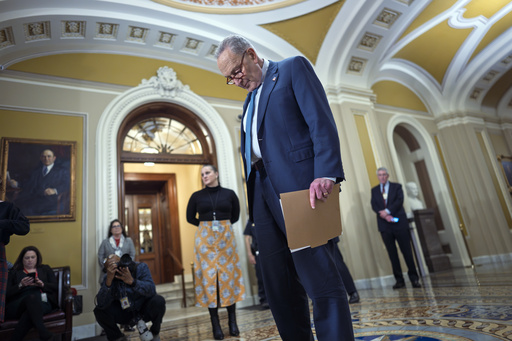
In a recent announcement, Congressional leaders have introduced a temporary spending bill aimed at sustaining government funding until March 14. This legislation is designed to allocate over $100 billion in emergency assistance to bolster recovery efforts for states and communities affected by Hurricanes Helene and Milton, along with other natural disasters.
The primary goal of this measure is to avert a partial government shutdown that is set to commence after midnight on Friday. The decision regarding the federal budget’s spending levels will be deferred until the incoming Republican-led Congress and President-elect Donald Trump assume office. The continuing resolution largely maintains existing funding levels for federal agencies.
This bill’s approval comes as lawmakers prepare to conclude their work for the holiday recess, marking one of their last acts before the new Congress takes over. It is noteworthy that this is the second short-term funding resolution that Congress has addressed this autumn, as they have grappled with passing the standard annual appropriations bills before the start of the fiscal year on October 1, a task they have struggled to complete.
The proposed measure includes $100.4 billion designated for disaster relief, alongside an additional $10 billion in economic aid for farmers facing the challenges of low commodity prices and soaring costs of production. “It is essential that we assist those who find themselves in these challenging situations,” stated House Speaker Mike Johnson during a recent press conference.
Experts project a decline of 4.1% in net farm income this year, following a previous decrease of 19.4% the year before, highlighting the struggles faced since the record highs of 2022. Johnson suggested that more financial support for farmers could be on the horizon in the upcoming Congress, emphasizing that “we can’t address everything right now.” He expressed confidence that the current efforts would positively impact the agricultural sector, stating, “Congress is doing its utmost under trying conditions.”
Senate Majority Leader Chuck Schumer emphasized that the agreement is “devoid of cuts and poison pills,” while also ensuring funding for several Democratic priorities, including child care, workforce training, and job placement services. “With this agreement, we are on track to prevent a government shutdown,” Schumer affirmed.
Rep. Glenn Thompson, the Republican chair of the House Agriculture Committee, expressed a desire for additional economic support for farmers, yet acknowledged that this bill represents a “great start.” He remarked, “This will signal to the markets that many farmers and ranchers will have access to credit necessary for planting crops or maintaining herds.”
President Joe Biden has requested approximately $114 billion in disaster assistance, with a formal $99 billion appeal made in November, citing the urgent need for funding. The administration later revised this request to include funds for repairing federal properties damaged by natural calamities.
The majority of the allocated funds, around $29 billion, is slated for the main disaster relief fund administered by the Federal Emergency Management Agency (FEMA), which assists in debris removal, restoration of public infrastructure, and financial aid to disaster survivors. An additional $21 billion will be directed toward supporting farmers facing losses in crops or livestock.
Moreover, $8 billion is earmarked for reconstructing and repairing highways and bridges across more than 40 states and territories. Additionally, approximately $12 billion will assist communities with recovery through block grants overseen by the Department of Housing and Urban Development. Just over $2 billion is allocated for low-interest loans for businesses, nonprofits, and homeowners engaged in rebuilding efforts after disasters.
While acknowledging that this might not be the legislation she would have personally drafted, Sen. Patty Murray, the Democratic chair of the Senate Appropriations Committee, characterized it as a robust, bipartisan initiative that provides much-needed resources for community recovery.
As lawmakers prepare to finalize the measure before the impending shutdown deadline, House Republicans typically afford their colleagues 72 hours to review the legislation’s text. If this timeframe is honored, the final vote could take place on Friday. The Senate, known for its slower pace, faces pressure from many members eager to adjourn for the year and pave the way for the next Congress.
Given that this bill is the last essential legislation of the current Congress, lawmakers have worked diligently to include key priorities. In the health care sector, the bill aims to extend telehealth appointment coverage for Medicare beneficiaries while also placing limits on the profits pharmacy benefits managers can earn from drug coverage negotiations.
Additionally, this legislation encompasses provisions aimed at counteracting China’s influence, including an expansion of a Biden executive order intended to limit investments in nations that pose security risks to the United States. The initiative to restrict China’s advancements in technology identifies a rare aspect of convergence between Republican and Democratic support in Washington.
One notable provision involves transferring ownership of the site of the former RFK Stadium from federal control to the District of Columbia, potentially paving the way for a new stadium for the Washington Commanders. Also, the bill assures full federal funding to reconstruct Baltimore’s Francis Scott Key Bridge, which collapsed after a cargo vessel lost power just before the incident. Taxpayers will be compensated through insurance payouts and pending litigation.
